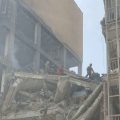Tensions in the Middle East have escalated dramatically, with a fourth day of intense fighting between Iran and Israel. The conflict began with an Israeli strike on Friday, prompting retaliatory missile attacks from Iran targeting major Israeli cities, including Tel Aviv, Jerusalem, and Haifa. Reports indicate damage to infrastructure, including a significant oil refinery in Haifa. Israeli Defense Minister Israel Katz has vowed that Tehran will “pay the price” for the attacks, emphasizing that the strikes are aimed at preventing the IDF from further actions against Iranian capabilities.
Iranian state media reported the use of “innovative methods” to overcome Israeli air defenses, highlighting the intensity and sophistication of the attacks. While Israel’s Iron Dome defense system is renowned for its effectiveness, the sheer volume of missiles launched has raised concerns about its capacity to neutralize all threats. The conflict has significant global implications, particularly given the potential impact on oil supplies and the strategic Strait of Hormuz.
Early market reactions have been somewhat muted, with some analysts suggesting this might reflect hopes for a swift resolution. However, the ongoing conflict remains a significant concern, leading to increased safe-haven demand and impacting oil prices. Gold prices saw a temporary surge, though they have since retreated slightly. While European and U.S. stock futures initially showed positive movement, the situation remains highly volatile and unpredictable.
The death toll continues to rise, with Magen David Adom (Israel’s national emergency service) reporting four fatalities and 87 injuries following rocket strikes. The extent of the damage and casualties is still being assessed. The United States’ response is closely watched, given its longstanding support of Israel and the recent cancellation of nuclear deal talks with Iran. President Trump’s stance against Tehran is expected to play a significant role in shaping the international response. Discussions concerning the conflict are also underway at the current G7 summit.
The situation remains fluid and deeply concerning. The potential for further escalation and regional instability remains high, making the coming days and weeks critical in determining the trajectory of this dangerous conflict. The international community is closely watching the situation, hoping for a de-escalation and a peaceful resolution to prevent further loss of life and widespread disruption.










